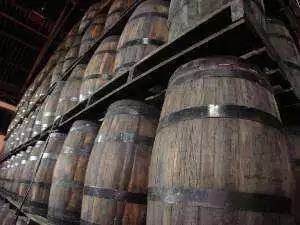
Celiac.com 10/22/2012 - Wine is naturally gluten-free, making it a go-to alcoholic drink for sufferers of celiac disease. However, some vintners use oak barrels sealed with wheat paste, which has made some people wonder if it is really gluten-free. An article posted by Tricia Thompson, MS, RD on her Gluten-Free Watchdog website may have finally put this worry to rest, as she has done a series of sandwich R5 ELISA and competitive R5 ELISA tests of various wines aged in such barrels.
So there's a wine you'd like to try, but you've heard that wine can be cross contaminated from the wheat paste some vintners use to seal oak barrels. The first thing to consider before spending too much time researching is that the Tobacco Tax and Trade Bureau currently disallows gluten-free labeling of alcoholic beverages if the producer used “storage materials that contained gluten.” This means any wine that is labeled as gluten-free was aged using a barrel alternative, and thus carries no danger of cross-contamination.
Celiac.com Sponsor (A12):
Another factor to consider is that while many wineries still use oak barrels, barrel alternatives are highly common as well. Roughly speaking, the more expensive ($12+) Cabernet Sauvignons, Merlots, Zinfandels and red blends are more likely to be aged in oak barrels (and for a longer period of time).
For those wines that are fermented in barrels, most wineries thoroughly pressure wash all barrels with boiling hot water before they are used. Additionally, it is not the staves of the barrels that are sealed with a wheat flour paste, but the barrel heads. The amount used to seal the head is minimal. Even so, the possibility of cross contamination has been a lingering question.
To get a sense of just how risky this cross contamination might be, Tricia Thompson tested a single winery's Cabernet Sauvignon and Merlot, which were the two wines that spent the most time in wheat-sealed oak barrels. She tested each wine four times: twice with the Sandwich R5 ELISA test, and twice with the competitive R5 ELISA test. The competitive R5 ELISA is the current standard for testing for hydrolyzed (broken down) gluten (as would be found in fermented products), while the sandwich R5 ELISA would detect any non-hydrolyzed gluten (as from a wheat paste).
Both extractions of both wines came back with the lowest possible results for both tests:
Cabernet Sauvignon
- Sandwich R5 ELISA extraction 1: < 5 ppm gluten
- Sandwich R5 ELISA extraction 2: < 5 ppm gluten
- Competitive R5 ELISA extraction 1: < 10 ppm gluten
- Competitive R5 ELISA extraction 2: < 10 ppm gluten
Merlot
- Sandwich R5 ELISA extraction 1: < 5 ppm gluten
- Sandwich R5 ELISA extraction 2: < 5 ppm gluten
- Competitive R5 ELISA extraction 1: < 10 ppm gluten
- Competitive R5 ELISA extraction 2: < 10 ppm gluten
Thompson's findings indicate that even wine that is aged in wheat-glue-sealed oak barrels contains less gluten than we are currently capable of testing for, whether hydrolyzed or not. If you're still skeptical, you can always do your own research and find out which of your favorite wines are aged using barrel alternatives.
Source:
- Open Original Shared Link







Recommended Comments
Create an account or sign in to comment
You need to be a member in order to leave a comment
Create an account
Sign up for a new account in our community. It's easy!
Register a new accountSign in
Already have an account? Sign in here.
Sign In Now